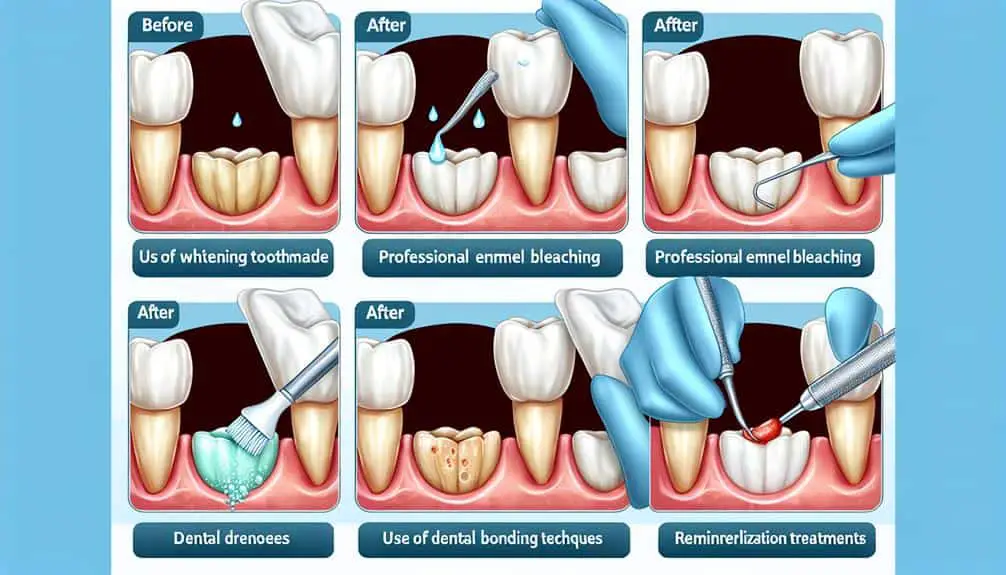If you're looking to whiten your damaged enamel, consider professional dental whitening, which includes laser treatments and bleaching methods. At-home whitening kits like ADA-approved products with hydrogen peroxide can safely break down stains. Additionally, natural remedies like oil pulling with coconut oil and neem-based products support enamel repair. Using whitening toothpaste and mouthwash, along with dietary changes like consuming dairy and avoiding acidic drinks, can also help restore enamel health. These methods offer effective ways to achieve a brighter smile and healthier enamel.
Key Points
- Professional dental whitening methods like laser treatments and veneers can effectively whiten damaged enamel.
- At-home whitening kits with ADA-approved products and custom trays offer safe enamel repair solutions.
- Natural remedies such as oil pulling and herbal tooth powders support enamel health and repair.
- Using whitening toothpaste and mouthwash, along with fluoride, helps remineralize and protect enamel.
- Dietary changes like consuming dairy products and avoiding acidic drinks aid in strengthening and whitening enamel.
Professional Dental Whitening
When considering methods to whiten damaged enamel, opting for professional dental whitening procedures can provide effective and long-lasting results. Two common professional treatments for whitening damaged enamel are laser whitening and bleaching treatments. Laser whitening involves the use of a specialized light to activate whitening agents on the teeth, resulting in a significant improvement in enamel color. On the other hand, bleaching treatments utilize powerful whitening agents to break down stains and discoloration on the enamel's surface.
In cases where damaged enamel requires more than just whitening, procedures like enamel bonding and veneers can be considered. Enamel bonding involves applying a tooth-colored resin to the surface of the tooth, which can help improve the appearance of damaged enamel. Veneers, on the other hand, are thin shells that are custom-made to cover the front surface of teeth, providing a natural-looking solution for stained or damaged enamel.
Consulting with a dental professional can help determine the most suitable professional whitening method for your specific enamel needs.
At-Home Whitening Kits
Interested in achieving a brighter smile from the comfort of your own home? At-home whitening kits can be a convenient way to whiten your teeth without the need for a dental visit. Many of these kits offer DIY enamel repair solutions and are designed to provide enamel safe treatments. When choosing an at-home whitening kit, look for products that are ADA-approved to guarantee their safety and effectiveness.
These kits typically contain a whitening agent, such as hydrogen peroxide, which helps to break down stains on the enamel surface. It's important to follow the instructions carefully to avoid damaging your enamel or gums. Most at-home whitening kits come with custom trays or strips that mold to your teeth for a comfortable fit and even distribution of the whitening agent.
While at-home whitening kits can be effective, it's crucial to use them in moderation and not exceed the recommended usage to prevent sensitivity or enamel damage. If you have any concerns about using these kits, consult your dentist for guidance on the best approach for your dental health.
Natural Remedies for Enamel Repair
To promote enamel repair naturally, consider incorporating proven home remedies into your oral care routine. Oil pulling benefits, a traditional Ayurvedic practice, involve swishing oil in your mouth to remove bacteria and promote overall oral health. Coconut oil is commonly used for this purpose due to its antimicrobial properties. Research suggests that oil pulling can help reduce plaque buildup and improve gum health, which indirectly supports enamel repair.
Herbal remedies for enamel repair can also be beneficial. For example, herbal tooth powders containing ingredients like neem, clove, and licorice can help strengthen enamel and combat oral bacteria. Neem, in particular, has been shown to possess antimicrobial and anti-inflammatory properties that support oral health.
Incorporating these natural remedies into your daily oral care routine can provide a holistic approach to enamel repair. While these methods may not offer immediate results, consistent use over time can contribute to healthier enamel and overall improved oral health.
Whitening Toothpaste and Mouthwash
Consider incorporating whitening toothpaste and mouthwash into your oral care routine to enhance the brightness of your smile and maintain peak oral hygiene. Whitening toothpaste often contains mild abrasives or polishing agents that can help remove surface stains, leading to a brighter appearance. Additionally, certain whitening toothpaste brands incorporate ingredients that promote enamel remineralization, aiding in strengthening and protecting your teeth. Look for toothpaste with fluoride to support enamel erosion prevention, as fluoride helps remineralize weakened enamel, making it more resistant to acid attacks that can lead to erosion.
When choosing a whitening mouthwash, opt for products that are alcohol-free to prevent dryness and irritation. Some whitening mouthwashes also contain hydrogen peroxide or carbamide peroxide, which can help lighten tooth color over time. Mouthwashes that include fluoride can further aid in enamel remineralization, contributing to overall enamel health. Incorporating these products into your daily routine can complement your efforts in maintaining a healthy, bright smile while safeguarding your enamel.
Dietary Changes for Enamel Health
For optimal enamel health, it's crucial to make strategic dietary adjustments by incorporating enamel-strengthening foods and avoiding acidic or sugary substances that can harm your teeth. Enamel-protecting foods such as dairy products rich in calcium and phosphorus, like milk, cheese, and yogurt, can help strengthen enamel due to their mineral content.
Additionally, crunchy fruits and vegetables like apples, carrots, and celery can aid in scrubbing away plaque and stimulating saliva production, which helps in protecting enamel.
Conversely, acidic drinks like sodas, fruit juices, and energy drinks can erode enamel over time, leading to tooth sensitivity and discoloration. Coffee and tea, while popular beverages, can also stain enamel. It's vital to limit the consumption of these acidic drinks and opt for water or milk whenever possible to maintain enamel health.
Frequently Asked Questions
Can Enamel Damage Be Reversed Completely With Whitening Methods?
Enamel damage can't be fully reversed with whitening methods due to its irreversible nature. Although whitening can improve appearance, it doesn't restore enamel permanently. Seek professional advice for enamel restoration options that suit your specific situation.
Are There Any Potential Side Effects of Using Whitening Toothpaste and Mouthwash on Damaged Enamel?
When considering whitening toothpaste and mouthwash for damaged enamel, it's important to be cautious about potential risks. While they may offer some effectiveness, safety concerns regarding their long-term results on already compromised enamel should be noted.
How Long Does It Typically Take to See Results From Natural Remedies for Enamel Repair?
For enamel repair, natural remedies' effectiveness varies. Results depend on the severity of damage and consistency of use. Typically, improvement can be noticed within a few weeks to a few months. Patience and adherence are key.
Are There Specific Dietary Changes That Can Worsen Enamel Damage, Even With Whitening Treatments?
When it comes to enamel health and whitening treatments, be mindful of dietary restrictions. Certain food and drink choices can have long-term effects on enamel, potentially counteracting the benefits of whitening treatments. Prioritize enamel-friendly options for best results.
Are There Any Alternative Methods for Whitening Damaged Enamel That Are Not Mentioned in the Article?
If you're exploring alternative ways to whiten damaged enamel beyond the usual methods, consider DIY remedies like baking soda paste or coconut oil pulling. Professional treatments from cosmetic dentistry, such as veneers or bonding, are also effective options.



